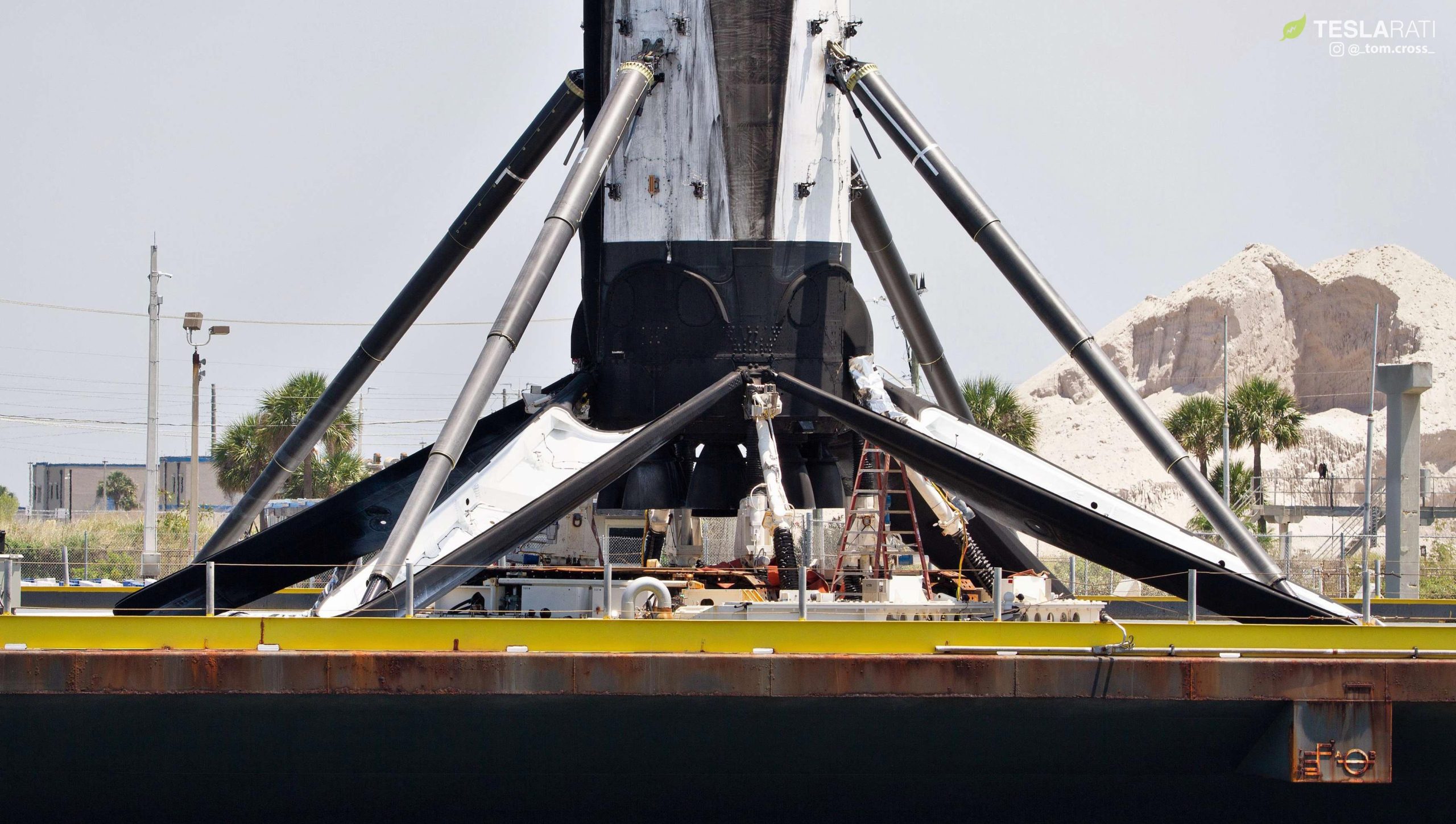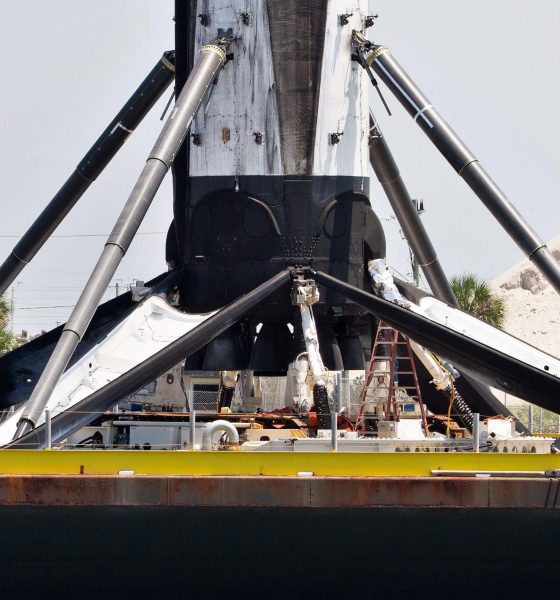

News
Kennedy Space Center wants a SpaceX Falcon 9 core for its Rocket Garden
SpaceX continues to make history with nearly every Falcon rocket launch, so it’s only fitting that one of the most well-known places for preserving rocket history, Kennedy Space Center (KSC) in Florida, would be interested in adding one of the company’s recovered cores to a display. SpaceX’s ‘flight proven’ collection is, after all, piling up. Even more relevant, however, is that most of those historic launches took place at KSC’s Launch Complex 39A.
After the Mars-bound enterprise successfully launched its third Falcon Heavy rocket this week, including the self-landed recovery of both side boosters, KSC directly voiced its interest in a SpaceX addition to their famous Rocket Garden display.
“Hint: We think a #Falcon9 and/or #FalconHeavy booster would look great in the Rocket Garden. ? We have the space available and the capability to make it happen,” Therrin Protze, COO of KSC’s Visitor Complex, tweeted to Elon Musk.
The request was quickly met with a positive reception by SpaceX’s CEO, confirming to fans and KSC visitors alike that both parties involved in making a display happen were on board with the idea. “Sure, that would be an honor,” Musk later replied after describing his admiration for the display. “I love the KSC rocket garden. Spent many days there looking at rocket design details.”
Sure, that would be an honor
— Elon Musk (@elonmusk) June 26, 2019

Kennedy Space Center’s Rocket Garden is currently home to a collection of rockets representing NASA’s Mercury, Gemini, and Apollo programs, including a Mercury-Redstone 3 rocket like the ones that put the first three American into space – Alan Shepard, Virgil “Gus” Grissom, and Ham the chimpanzee. Interestingly enough, while the Rocket Garden represents human achievements in space travel, the addition of a recovered Falcon core would represent the only resident to have actually left Earth, a distinction that wasn’t necessary only a few years ago. In effect, SpaceX’s success in recovering as much of each launch vehicle as possible would cast a new light on Rocket Garden tours with a Falcon in its midst, increasing expectations that one-and-done space travel is now largely a thing of the past.
If all goes well and a deal comes out of the SpaceX and KSC affirmations, the rocket will eventually join a few others in line to dot the country with space-faring Falcon cores. Among those planned is a display at Houston Space Center in Texas via a deal inked in May this year. The rocket is initially planned to be on its side and raised off the ground to allow visitors to walk underneath. One of the special aspects of Falcon’s presence in Houston, itself full of incredible spaceflight history, is why the Center chose to include a SpaceX vehicle in its display collection.
“[We want to]… interpret the history of the space program, but also interpret for the public what is currently going on and where we are going moving on into the future,” William Harris, president and CEO of Space Center Houston, said in an interview with collectSPACE. “With the relationship that NASA has with the commercial sector in support of the International Space Station and other missions, I felt we really needed to begin interpreting that as well.”
SpaceX also has plans for its very own rocket garden alongside an expanded presence at its launch facility in Florida. The company aims to build a dedicated facility for storing, refurbishing and decommissioning Falcon 9 and Falcon Heavy boosters and payload fairings “immediately” after construction approvals are granted, according to an environmental assessment published in April 2018. Included in the plan are 50 acres of land, a 130,000 square foot facility (with and additional 100,000 square-foot facility option, if needed), and a place to display decommissioned Falcon 9 and Falcon Heavy boosters, recovered fairings, and its Dragon spacecraft, assuming they won’t be donated to museums instead.
Until the construction for all planned sites are completed, SpaceX’s Hawthorne, California headquarters has the only Falcon on display for visitors to admire. The first booster the company recovered in December 2015 stands 156 feet tall on the corner of Crenshaw Boulevard and Jack Northrop Avenue, and it has since been the site for an untold number of visitors taking selfies, sharing their excitement for SpaceX’s achievements all over social media. Until more flight-proven cores are distributed, fans will have to just make due watching Falcon cores come home after ocean drone ship landings.

Cybertruck
Tesla drops latest hint that new Cybertruck trim is selling like hotcakes
According to Tesla’s Online Design Studio, the new All-Wheel-Drive Cybertruck will now be delivered in April 2027. Earlier orders are still slated for early this Summer, but orders from here on forward are now officially pushed into next year:

Tesla’s new Cybertruck offering has had its delivery date pushed back once again. This is now the second time, and deliveries for the newest orders are now pushed well into 2027.
According to Tesla’s Online Design Studio, the new All-Wheel-Drive Cybertruck will now be delivered in April 2027. Earlier orders are still slated for early this Summer, but orders from here on forward are now officially pushed into next year:
🚨 Tesla has updated the $59,990 Cybertruck Dual Motor AWD’s estimated delivery date to April 2027.
First deliveries are still slated for June, but if you order it now, you’ll be waiting over a year.
Demand appears to be off the charts for the new Cybertruck and consumers are… pic.twitter.com/raDCCeC0zP
— TESLARATI (@Teslarati) February 26, 2026
Just three days ago, the initial delivery date of June 2026 was pushed back to early Fall, and now, that date has officially moved to April 2027.
The fact that Tesla has had to push back deliveries once again proves one of two things: either Tesla has slow production plans for the new Cybertruck trim, or demand is off the charts.
Judging by how Tesla is already planning to raise the price based on demand in just a few days, it seems like the company knows it is giving a tremendous deal on this spec of Cybertruck, and units are moving quickly.
That points more toward demand and not necessarily to slower production plans, but it is not confirmed.
Tesla Cybertruck’s newest trim will undergo massive change in ten days, Musk says
Tesla is set to hike the price on March 1, so tomorrow will be the final day to grab the new Cybertruck trim for just $59,990.
It features:
- Dual Motor AWD w/ est. 325 mi of range
- Powered tonneau cover
- Bed outlets (2x 120V + 1x 240V) & Powershare capability
- Coil springs w/ adaptive damping
- Heated first-row seats w/ textile material that is easy to clean
- Steer-by-wire & Four Wheel Steering
- 6’ x 4’ composite bed
- Towing capacity of up to 7,500 lbs
- Powered frunk
Interestingly, the price offering is fairly close to what Tesla unveiled back in late 2019.
Elon Musk
Elon Musk outlines plan for first Starship tower catch attempt
Musk confirmed that Starship V3 Ship 1 (SN1) is headed for ground tests and expressed strong confidence in the updated vehicle design.

Elon Musk has clarified when SpaceX will first attempt to catch Starship’s upper stage with its launch tower. The CEO’s update provides the clearest teaser yet for the spacecraft’s recovery roadmap.
Musk shared the details in recent posts on X. In his initial post, Musk confirmed that Starship V3 Ship 1 (SN1) is headed for ground tests and expressed strong confidence in the updated vehicle design.
“Starship V3 SN1 headed for ground tests. I am highly confident that the V3 design will achieve full reusability,” Musk wrote.
In a follow-up post, Musk addressed when SpaceX would attempt to catch the upper stage using the launch tower’s robotic arms.
“Should note that SpaceX will only try to catch the ship with the tower after two perfect soft landings in the ocean. The risk of the ship breaking up over land needs to be very low,” Musk clarified.
His remarks suggest that SpaceX is deliberately reducing risk before attempting a tower catch of Starship’s upper stage. Such a milestone would mark a major step towards the full reuse of the Starship system.
SpaceX is currently targeting the first Starship V3 flight of 2026 this coming March. The spacecraft’s V3 iteration is widely viewed as a key milestone in SpaceX’s long-term strategy to make Starship fully reusable.
Starship V3 features a number of key upgrades over its previous iterations. The vehicle is equipped with SpaceX’s Raptor V3 engines, which are designed to deliver significantly higher thrust than earlier versions while reducing cost and weight.
The V3 design is also expected to be optimized for manufacturability, a critical step if SpaceX intends to scale the spacecraft’s production toward frequent launches for Starlink, lunar missions, and eventually Mars.
News
Tesla FSD (Supervised) could be approved in the Netherlands next month: Musk
Musk shared the update during a recent interview at Giga Berlin.

Tesla CEO Elon Musk shared that Full Self-Driving (FSD) could receive regulatory approval in the Netherlands as soon as March 20, potentially marking a major step forward for Tesla’s advanced driver-assistance rollout in Europe.
Musk shared the update during a recent interview at Giga Berlin, noting that the date was provided by local authorities.
“Tesla has the most advanced real-world AI, and hopefully, it will be approved soon in Europe. We’re told by the authorities that March 20th, it’ll be approved in the Netherlands,’ what I was told,” Musk stated.
“Hopefully, that date remains the same. But I think people in Europe are going to be pretty blown away by how good the Tesla car AI is in being able to drive.”
Tesla’s FSD system relies on vision-based neural networks trained on real-world driving data, allowing vehicles to navigate using cameras and AI rather than traditional sensor-heavy solutions.
The performance of FSD Supervised has so far been impressive. As per Tesla’s safety report, Full Self-Driving Supervised has already traveled 8.3 billion miles. So far, vehicles operating with FSD Supervised engaged recorded one major collision every 5,300,676 miles.
In comparison, Teslas driven manually with Active Safety systems recorded one major collision every 2,175,763 miles, while Teslas driven manually without Active Safety recorded one major collision every 855,132 miles. The U.S. average during the same period was one major collision every 660,164 miles.
If approval is granted on March 20, the Netherlands could become the first European market to greenlight Tesla’s latest supervised FSD (Supervised) software under updated regulatory frameworks. Tesla has been working to secure expanded FSD access across Europe, where regulatory standards differ significantly from those in the United States. Approval in the Netherlands would likely serve as a foundation for broader EU adoption, though additional country-level clearances may still be required.








